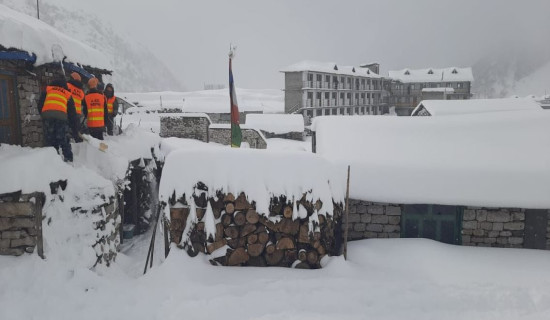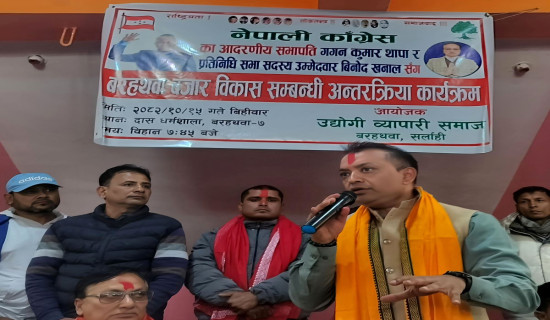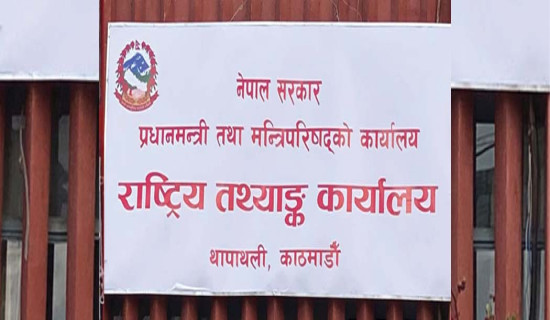- Friday, 30 January 2026
Supply chain disruptions lead to vegetable shortages, price hikes
Kathmandu, Sept. 12: Vegetable supply across the Kathmandu Valley has been severely disrupted in the aftermath of the recent Gen-Z protests, causing a sharp rise in prices and widespread shortages in local markets.
The demonstrations, which took place on Monday and Tuesday, and the abnormal situation after that have significantly hindered the transportation of vegetables from key producing districts such as Kavrepalanchowk, Dhading, and Makwanpur to Kathmandu Valley.
As a result, major wholesale markets, including the Kalimati Fruits and Vegetable Market, have seen a drastic reduction in supply for the last three days.
Binaya Shrestha, information officer at the Kalimati Fruits and Vegetable Market Development Board, said that vegetable inflow has been critically low since Tuesday in the market due to the effect of Gen-Z protest across the country.
“Only 200 tonnes of green vegetables entered Kalimati on Wednesday morning. But, this number dropped to below 100 tonnes by Thursday,” he said. This is a steep decline from the usual daily supply of above 700 tonnes in the Kalimati wholesale market.
Even though the supply of vegetables reduced in the market in last two days, stock of vegetables that entered the Valley before Gen-Z protest and lower supply has met the demand for vegetables until Thursday, he said.
No stock of vegetable at Kalimati market
While earlier stockpiles and limited local supply from within the Valley—particularly from Kathmandu, Bhaktapur, and Lalitpur—partially met the market demand, there is no vegetable in stock at the Kalimati market as of Thursday afternoon.
The Nepali Army, which has been in command of public safety since Tuesday evening, eased the restriction order this morning, allowing traders and consumers to buy and sell essential products.
Shrestha expressed hope that the supply would gradually normalise from Friday morning, as vegetables remain available in farms and transportation is expected to resume with easing of restrictions enforced by Nepal Army.
Bhagawan Chandra Upreti, a wholesaler at the Kalimati market, said, “With no fresh supply in the market, we sold the remaining stock of vegetables today.
"There is almost nil supply of the fresh vegetables in the market. We, the traders, sold almost all stocked vegetables today. It is certain that the vegetables from various parts of the country, including Kavrepalanchowk, Dhading, Makwanpur will enter the market from Thursday night," he said.
Upreti noted that wholesale prices have remained relatively stable as traders focus on clearing old stock.
He, however, said that the price of vegetables in the retail market increased due to lack of vegetables.
Upreti said that the price of vegetables might be reduced even in the retail market after improving the supply from Friday morning.
Price increased by up to Rs. 50 per kg in retail
Gayatri Banjara of Gatthaghar said that the prices of vegetables have skyrocketed in the market since Wednesday.
"On Thursday, I bought a kilo of tomatoes for Rs. 80 per kilo and cauliflower for Rs. 140 per kilo. It is more expensive than earlier prices. We, consumers, always suffer from price increases, no matter what the situation,” she said.
She complained that there are no fresh vegetables in the market, but even vegetables that have been stored for two or three days are expensive to buy.
Sanjaya Shrestha, a retailer in Bhaktapur, said that vegetable prices have increased by as much as Rs. 50 per kg in just two days.
“Due to lack of supply of vegetables in the wholesale market, we, the retailers, are forced to buy from farmers and suppliers at inflated rates,” he said. Due to this, consumers have to pay high price of vegetables, he said.
According to Shrestha, the retail price of cauliflower rose from Rs. 80 to Rs. 130 per kg since Monday.
Cabbage is now being sold at Rs. 70 per kg, up from Rs. 50, while tomato prices have jumped from Rs. 60 to Rs. 80 per kg.
Okra saw a particularly steep rise, climbing from Rs. 60 to Rs. 100 per kg, he said.
He said that the price of Indian potatoes has increased by Rs. 10 per kg in a day on Thursday.
A kg of Indian potatoes is being sold at Rs. 40 per kg on Thursday while it was sold at Rs. 30 per kg on Wednesday.
"Even paying these high prices, it’s difficult to get vegetables as per choice and demand. If supply doesn't improve soon, we may not be able to get vegetables at all—regardless of how much we're willing to pay,” said Shrestha.
Shrestha said that the vegetables, including cauliflower, cabbage, tomatoes, are being supplied from the local area.

















